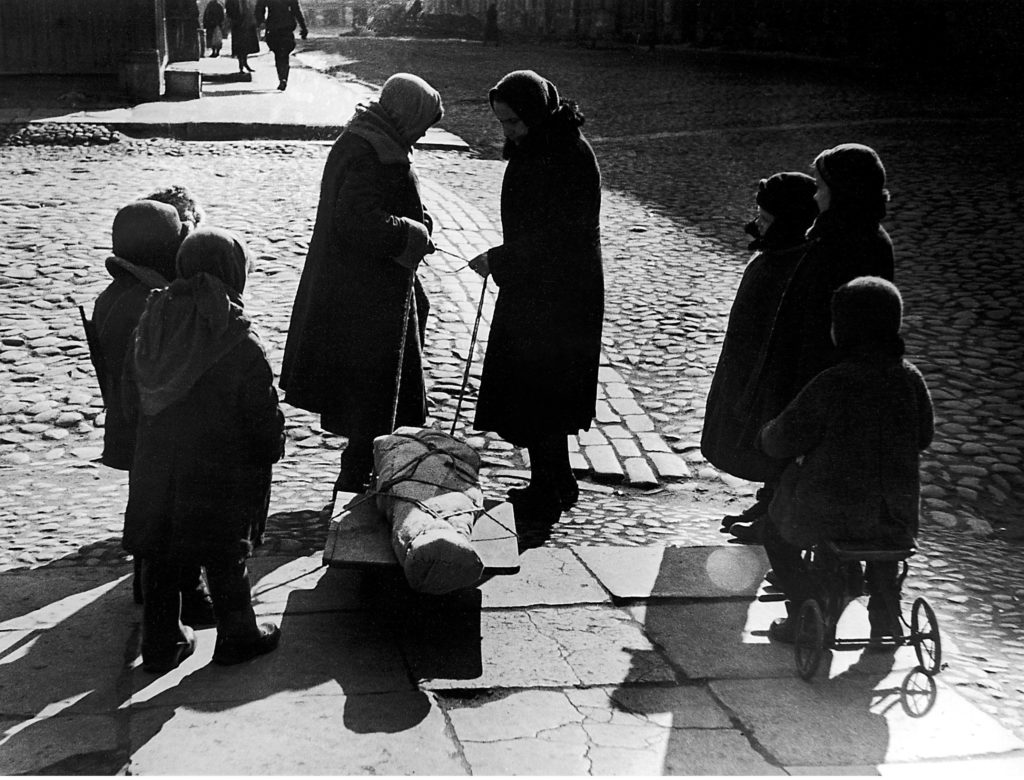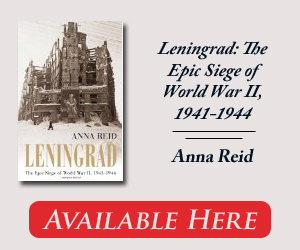
Leningrad: The Epic Siege of World War II, 1941–1944, by Anna Reid, Walker, 492 pp., $30
The 900-day Nazi siege of Leningrad, from September 1941 through January 1944, has been overshadowed in Western memory by the still greater horrors of the Second World War. In any other comparison, it would have become for us what it is for Russians: a case of the most extreme privation and a test of the very nature of human existence. “I think that real life is hunger, and the rest a mirage,” observed one of Russia’s greatest literary scholars, Dmitri Likhachev, as he wasted away. “In the time of famine people revealed themselves, stripped themselves, freed themselves of all trumpery. Some turned out to be marvelous, incomparable heroes, others—scoundrels, villains, murderers, cannibals. There were no half measures. … The heavens were unfurled and in them God was seen.”
Four times as many people died in blockaded Leningrad as in the bombings of Hiroshima and Nagasaki combined, primarily of starvation but also of cold, since, even by Russian standards, the winter of 1941–42 was exceptionally frigid. As always happens during a famine, people already weakened from hunger succumbed to disease, especially typhus, typhoid, and dysentery. Many near starvation died of diarrhea. With plumbing destroyed by bombing or the cold, piles of excrement and cascades of frozen urine proliferated, indoors and out, beside unburied corpses. Officials coined a new medical diagnosis—“dystrophy”—to subsume the many types of fatal enfeeblement.
In contrast to most blockaders, the Germans enforced starvation not merely as a means to an end but as an end in itself. They planned to exterminate the entire population and then to level the city. They envisaged the same fate for Moscow.
While the ring was closing, the Soviets, with their usual gross inefficiency, failed to evacuate more than a small portion of the civilians or bring in much food. In the two months before the last train departed the city, they managed to remove about as many people as Britain evacuated from London in the first few days after declaring war. Two and a half million civilians, including 400,000 children, were left behind.
To be sure, many people avoided leaving. Some anticipated—correctly, as it turned out—that if they abandoned their apartments, they would never get them back. Besides, the Great Purges had concluded only a year and a half before, and it still was hard for most Russians to imagine entrusting their lives to the Soviet police, which oversaw the evacuations. In fact, the government’s first reaction to the invasion was to order mass arrests. Throughout the siege Stalin’s secret police, the NKVD, continued to interrogate, arrest, and shoot people they suspected of “defeatism.”
Sovinform, the Soviet news bureau, broadcast patent falsehoods and what one correspondent referred to as “Ivan Pupkin killed five Germans with a spoon” stories. Such absurdities long made it hard to believe that life wouldn’t be better under anyone but the Bolsheviks. Since officers were shot for retreating or even for reporting desperate situations, internal army communications grew as unreliable as the propaganda for the masses.
Without waiting for the German Wehrmacht or their own NKVD to do it for them, many Russian soldiers and civilians took their own lives. “We measured time by the intervals between one suicide and the next,” recalled poet Olga Berggolts. As families slowly starved, parents had to decide which child or grandparent should receive enough food to live at the expense of the others. When one person died, the family kept the corpse until the ration card expired. To steal someone’s ration card was to murder him, and criminal gangs engaged in the trade. A child who survived the rest of his family became a vagabond without a ration card, living, if at all, by theft.
Cannibalism, though always evoking horror, became common. As it happens, Russian has two words for cannibalism, trupoyedstvo (“corpse-eating”) and lyudoyedstvo (“people-eating”), depending on whether one simply discovered a body or actually killed someone for food. Medical personnel ate limbs they amputated.
And yet the band played on, literally. Concerts were given, and in one case a tenor died shortly after singing his final note. When Shostakovich was inspired to write a patriotic symphony expressing faith in victory—or so official interpretation ran—he was evacuated by air to Moscow and, from there, by train to Kuibyshev to complete it and arrange performances. The comedy theater continued to put on musicals. (If only they could have done Candide!) This being Russia, the whole experience became an occasion for writing, as if anything could be redeemed by inspired verse. Evidently, for Russians, the purpose of life is to make it into literature. One reason we know so much about the siege is that, in addition to the exceptionally talented writers who recorded their impressions, many ordinary people kept diaries.
In Leningrad: The Epic Siege of World War II, 1941–1944, British journalist Anna Reid makes brilliant use of these memoirs, many only recently published, along with the contents of archives opened since the fall of the Soviet Union. The siege remained a sensitive topic for the Soviets, at first because it seemed to cast doubt on Stalin’s wisdom and later because it gave rise to official epic narratives. Sanitized, formalized, and mythologized, the siege became (as Shostakovich described the reception of his music) “covered with syrup.” Westerners, especially but not only leftists, tended to repeat the Soviet line.
 Chapter by chapter, Reid offers considered judgments as she brings the experience to life—if that is the phrase—with moving anecdotes and telling quotations. It would have been easy to ruin such an account with high dudgeon or, quite the opposite, with the “scientific” absence of moral sensibility. Another writer might have substituted her own voice for those of the besieged, but Reid allows the blokadniki their inimitable tone. So compelling is her narrative that I found myself reading and rereading it.
Chapter by chapter, Reid offers considered judgments as she brings the experience to life—if that is the phrase—with moving anecdotes and telling quotations. It would have been easy to ruin such an account with high dudgeon or, quite the opposite, with the “scientific” absence of moral sensibility. Another writer might have substituted her own voice for those of the besieged, but Reid allows the blokadniki their inimitable tone. So compelling is her narrative that I found myself reading and rereading it.
After the war, Leningraders felt they had earned a measure of trust: the right to travel abroad, to speak their minds, even to vote in elections with more than one candidate. But for that very reason, Stalin chose more repression. Just as—incredibly—Russian POWs, regarded as dangerous because they had seen life abroad, were upon repatriation promptly condemned to the gulag, so Leningraders faced the cultural and political purges of the “Leningrad Affair.” Arrest was the reward for speaking of the early months of the siege, when the failures of the Communist Party grew so conspicuous. Leningraders found they had escaped the fire for the frying pan. Likhachev understandably concluded that “we were doubly besieged, from within and without.” The one from within would last another 40 years. But memory has at last escaped the blockade.

